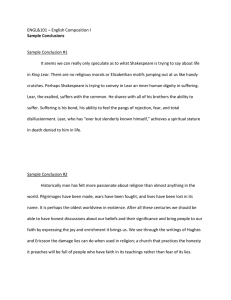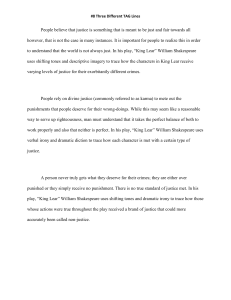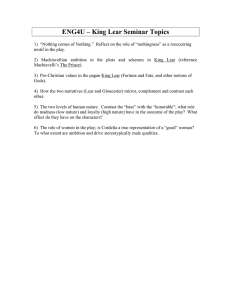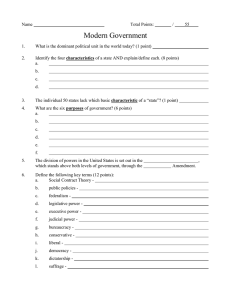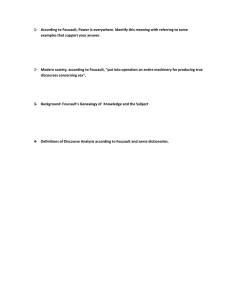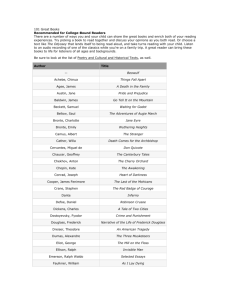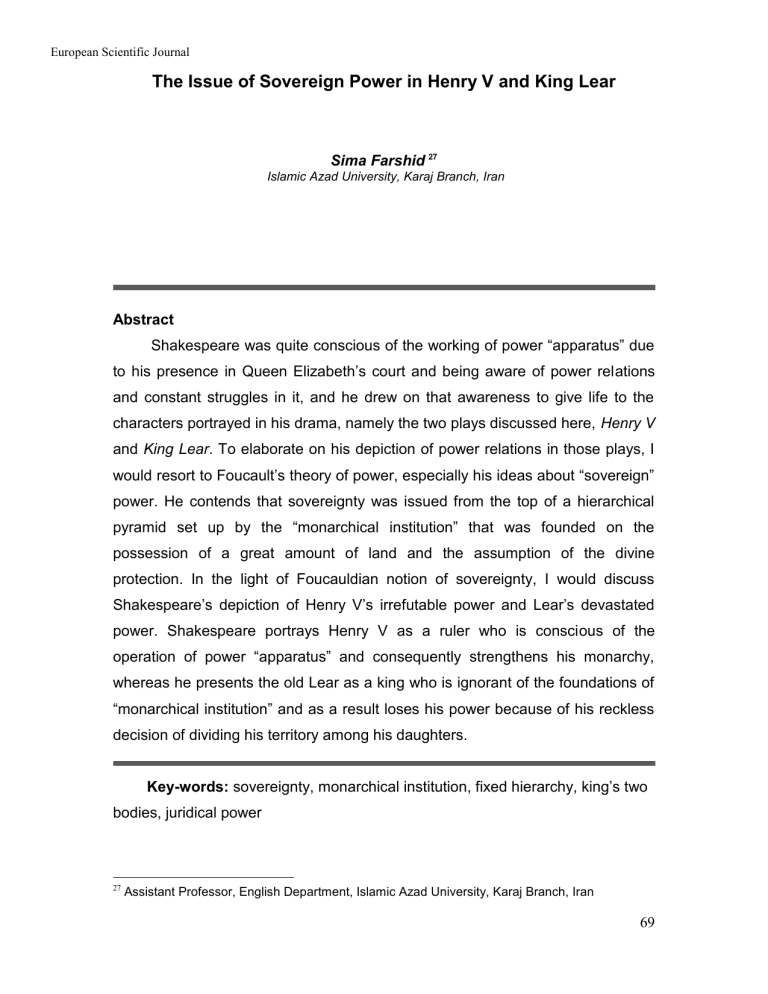
European Scientific Journal The Issue of Sovereign Power in Henry V and King Lear Sima Farshid 27 Islamic Azad University, Karaj Branch, Iran Abstract Shakespeare was quite conscious of the working of power “apparatus” due to his presence in Queen Elizabeth’s court and being aware of power relations and constant struggles in it, and he drew on that awareness to give life to the characters portrayed in his drama, namely the two plays discussed here, Henry V and King Lear. To elaborate on his depiction of power relations in those plays, I would resort to Foucault’s theory of power, especially his ideas about “sovereign” power. He contends that sovereignty was issued from the top of a hierarchical pyramid set up by the “monarchical institution” that was founded on the possession of a great amount of land and the assumption of the divine protection. In the light of Foucauldian notion of sovereignty, I would discuss Shakespeare’s depiction of Henry V’s irrefutable power and Lear’s devastated power. Shakespeare portrays Henry V as a ruler who is conscious of the operation of power “apparatus” and consequently strengthens his monarchy, whereas he presents the old Lear as a king who is ignorant of the foundations of “monarchical institution” and as a result loses his power because of his reckless decision of dividing his territory among his daughters. Key-words: sovereignty, monarchical institution, fixed hierarchy, king’s two bodies, juridical power 27 Assistant Professor, English Department, Islamic Azad University, Karaj Branch, Iran 69 European Scientific Journal Introduction Henry V and King Lear present Shakespeare as highly conscious of power mechanisms in pre-modern societies where landowning was the foundation of power. While in the first play he depicts a shrewd king who is mindful of power relations, in the second one he pictures a king who is ignorant of them. As the most celebrated figure among the monarchs Shakespeare has ever created, Henry V is portrayed as a ruler who is very cognizant of the operation of power “apparatus” and consequently strengthens his monarchy that seems to be irrefutable, whereas the old Lear is presented as being ignorant of foundation of “monarchical institution” – landowning, and consequently loses his power because of the reckless decision of dividing his kingdom. To elaborate on Shakespeare’s portrayal of the monarchic power in these historical and tragic plays, I resort to Foucault’s ideas about “sovereignty”, as he contends that pre-modern power was exerted by the sovereign, from the top of a hierarchical pyramid that was founded on the possession of a large amount of land and the assumption of the divine protection. In the light of these notions, I try to show Shakespeare’s witty picture of the working of power mechanisms in Henry V and King Lear. More than other critics, new historicists and cultural materialists have discussed the notion of power in Shakespeare’s drama. While cultural materialists consider Shakespeare “impartial on the question of politics” (Dollimore 231), new historicists “suggest that, even though many of Shakespeare’s plays give voice to subversive ideas, such questionings of the prevalent social order are always ‘contained’ within the terms of the discourses which hold that social order in place” (Selden 164). The second argument appeals more to me because in most of his works, Shakespeare appears to be an advocate of aristocracy. His endorsement of the British monarchy is more highlighted in Henry V than his other plays, as he “openly celebrates the achievements of a successful king” (Ousby 453) in that dramatic support of English royalty. Unlike Henry V in which he “celebrates” a powerful monarch, his King Lear draws the picture of an irrational ruler whose loss of power is the direct outcome of his injudiciousness. The different conducts of these two kings that 70 European Scientific Journal make their creator “celebrate” one and condemn the other would be discussed here by taking into account Foucault’s ideas. Foucault’s Ideas about Sovereign Power The well-known French thinker Michel Foucault has written many books on various subjects, but his major concern has always been “power relations”, either in a family, a clinic, a prison, or in the all-encompassing society. His inquiries into power relations have influenced a good number of social and political theoreticians besides literary critics. His theory about the “omnipresence of power”, dispersed all over society and issued from various social locations, has been one of the most inspiring theories of the final decades of the twentieth century, and his ideas about power/resistance and the relation of power and knowledge are exploited in many arguments of our time. The study of differences between modern and pre-modern forms of power is a noteworthy aspect of Foucault’s theory of power, elaborated mostly in Discipline and Punish (1975) and the first volume of The History of Sexuality (1978). He contends that an important change in the form of power occurred in the seventeenth and eighteenth centuries that witnessed a shift “from a system where the king or queen is seen as the embodiment of the nation and power is dispersed from above, to a system where power is exercised within the social body” (Mills 43). Since Foucault is a philosopher- historian, his investigations of pre-modern power are not detached from his inquiries into system of thought. In The Order of Things (1966), he traces a “hiatus in philosophical thought which divides what he calls the Classical Age from the Age of Man or the Age of Modernity”, and confirms that the “watershed between the Classical Age and the Age of Modernity coincides roughly with the life and work” Immanuel Kant (Christmas 162) who held that “the knowing subject is not outside the world but wholly involved in it as an object” (163). Elaborating on the “classical system” of thought, Foucault contends that “thought in the Classical Age had been united by the idea of an ordered universe which could be understood by analyzing it into simple elements” (Christmas 162). 71 European Scientific Journal The originator of that “ordered universe” was God (gods) or the First Cause, and the top of hierarchical system of power on the earth – the Chain of Being, was the place of the powerful monarch, as it was a wide-spread belief that “Behind the presence of the king stood … God himself” (During 147- 48). In The History of Sexuality Vol. I, Foucault scrutinizes the classical or pre-modern system of power – the “monarchical institution” (88), that “developed in the Middle Ages” (86), but retained its power till the eighteenth century: The great institution of power that developed in the Middle Ages – monarchy, the state with its apparatus – rose up on the basis of a multiplicity of prior powers, and to a certain extent in opposition to them: dense, entangled, conflicting powers, powers tied to the direct or indirect dominion over the land, to the possession of arms, to serfdom …. If these institutions were able to implant themselves, if, by profiting from a whole series of tactical alliances, they were able to gain acceptance, this was because they presented themselves as agencies of regulation, arbitration, and demarcation, as a way of introducing order in the midst of these powers, of establishing a principle that would temper them and distribute them according to boundaries and a fixed hierarchy. (History of Sexuality, Vol. I 86- 87) Unlike decentralized modern power that is “exercised from innumerable points”, through “complicated and heterogeneous social networks” (Rouse 109), pre-modern power was centralized in the hands of the sovereign who, though emerging from a “multiplicity of prior powers”, set its power above other powers by asserting himself through the claim of “regulation, arbitration and demarcation” for bringing about order, and by a “whole series of tactical alliances” gained the approval of those who possessed “land … [and] arms”, and thereby imposed his power on them and “establish[ed] a principle that would … distribute[power] according to …a fixed hierarchy”. Joseph Rouse restates the major points of the quoted part above in this way: 72 European Scientific Journal First, sovereignty is a standpoint above or outside particular conflicts that resolves their competing claims into a unified and coherent system. Second, the dividing question in terms of which those claims are resolved is that of legitimacy often framed in terms of law or rights: Which powers can be rightfully exercised, which actions are lawful, which regimes are legitimate. Together, these two points present the sovereign as the protector of peace in the war of all against all, and the embodiment of justice in the settling of competing claims. The third point …. Although there are no limits to the scope of sovereign power [everyone and everything is, in principle, subject to the sovereign], the actual exercise of that power must always be discontinuous. Sovereign power comes into play only at specific points where law or rights have been violated, and can only act to punish or restrain the violation. … Sovereign power prohibits, confiscates, or destroys what sovereign judgment pronounces illegitimate. Foucault therefore speaks interchangeably of “sovereign power” and “juridical power”. (100- 101) Besides founding a “unified and coherent system” that apparently resolved all conflicts, the monarch was supposed to represent God on the earth – hence the claim of being the “embodiment of justice”, due to possessing the divine right to decide what was “lawful” and “legitimate”. The notion of “King’s two bodies” (During 147) was exploited to strengthen the absolute power of the sovereign; he was “supposed to have both an actual and a symbolic body, the latter in attendance at state and juridical occasions” (147), since his “symbolic body” represented the divine power. All in all he possessed an absolute, god-like power that allowed him to exclude, remove and obliterate whatever his “judgment pronounce[d] illegitimate”. Therefore Foucault “speaks interchangeably of “sovereign power” and “juridical power”. To sustain the “sovereign power”, whenever its “law or rights [were] violated, the “juridical power” came “into play”, to “punish … violation” by “hanging, drawing, quartering … in cruel quasitheatrical spectacles” (148). 73 European Scientific Journal Foucault confirms that “monarchical institution” retained its centralized power till the seventeenth century when “the view that power is a sovereign’s right was inverted”, and monarch’s “rights were transformed into so-called ‘natural rights’, considered to be derived from a pre-historical, social contract in which subjects gave up their liberties so as to establish social order” (During 149) – the well-known notion of “social contract”, propounded by Rousseau. As a result of questioning the absolute power of monarchy, kings were dethroned and lost their power through a series of uprisings and revolutions in the seventeenth century (in England) and the eighteenth century (over the continent). The target of those wide-spread insurgences, Foucault believes, was not the “juridicomonarchic” system, but the sovereign who “set [him]self above the laws”: Criticism of the eighteenth-century monarchic institution in France was not directed against the juridico-monarchic sphere as such, but was made on behalf of a pure and rigorous juridical system to which all mechanisms of power could conform, with no excesses or irregularities, as opposed to a monarchy which, notwithstanding its own assertions, continuously overstepped its legal framework and set itself above the laws. (History of Sexuality, Vol. I 88) Whether those who revolted against kings “on behalf of a pure and rigorous juridical system” actualized such a system is a crucial question that needs attention! 1. Sovereign Power in Henry V and King Lear The greatest dramatist of the world was quite conscious of the working of power apparatus, since he had read a good many books of history, was patronized by an aristocrat, and performed his plays in the court – hence getting aware of ongoing struggles and enmities in monarchical system. He has depicted the attempts of sovereignty to maintain its power, and the ambitions of those who made efforts to take its place and attain its power not only in historical plays 74 European Scientific Journal such as Henry VIII and Richard III, but also in tragedies such as Hamlet and Macbeth. As one of the keys to his continuous appeal to us, Shakespeare’s attitude toward monarchy is as complicated as his way of posing other points, therefore we observe a debate over his attitude between new historicists and cultural materialists. While the latter contend that Shakespeare was “impartial on the question of politics” ( Dollimore 231 ), the former “suggest that, even though many of Shakespeare’s plays give voice to subversive ideas, such questionings of the prevalent social order are always ‘contained’ within the terms of the discourses which hold that social order in place” (Selden 164). Although many of Shakespeare’s works hold out evidence to prove Dollimore’s assertion, Henry V, I believe, should be considered an exception, because it is his only historical play that “openly celebrates the achievements of a successful king” (Ousby 453) who unites the country. Like other eminent Foucault points out historians of the last two centuries, such as Marx, that sovereign power was fundamentally based on the possession of land: “monarchy”, he states, “rose upon the basis of a multiplicity of prior powers … [that were] tied to the direct or indirect dominion over the land” ( History 86). One can observe by far the crucial importance of land for establishing and sustaining the sovereign power in both Henry V and King Lear, but when Henry recognizes that important matter, Lear ignores it. Possession of some lands on which both England and France had claims is the cause of the war upon which the plot of Henry V is structured. The importance of that possession for maintaining the sovereign power is so much that the king uses the word “love” while talking to the subjugated French princess at the end of the play. Henry makes efforts to convince her that he is not an enemy, since he loves France: 75 European Scientific Journal Catherine Is it possible dat I sould love de ennemi of France? King Harry No, it is not possible you should love the enemy of France, Kate. But in loving me, you should love the friend of France, for I love France so well that I will not part with a village of it, I will have it all mine; and Kate, when France if mine, and I am yours, then yours is France, and you are mine. (V. ii. 170- 176) [emphasis added] Henry’s craftiness in playing with language is remarkable, especially in the last part, nevertheless his desire for possessing France to expand his power is expressed explicitly at lines 173-75. One of those “prior powers” “upon [whose] basis” monarchy “rose” was the Church – the principal landowner of the Middle Ages. The close relationship between the sovereign and ecclesiastical powers, and how shrewdly the Church supported monarchy by referring to the holy texts are notably depicted in Henry V. In the first dialog of the play, between Archbishop Canterbury and Bishop Ely, the importance of the land for the Fathers of Church, and also their support of the king for the sake of their own benefits are stated in a straight line. Canterbury tells Ely: “If it pass against us, /We lose the better half of our possession” (I. i. 78), and afterward they state: Canterbury The king is full of grace and fair regard. Ely And a true lover of the holy Church. (I. i. 23- 24) Moreover Canterbury wishes the divine protection for Henry in the second scene: “God and his angles guard your sacred throne” (I. ii. 7). He considers Henry’s throne “sacred”, because, as mentioned in the former part of this article, “Behind the presence of the King stood…God himself” (During 147- 48).When 76 European Scientific Journal Henry asks Canterbury about the righteousness of his claim on the French lands he has decided to seize (since he is related to the ancient ruler of the lands through descending from a female ancestor), Canterbury replies: Canterbury ……………… … There is no bar To make against your highness’ claim to France But this, which they produce from Pharamond: ‘In terram Salicam mulieres ne succedant’ – ‘No woman shall succeed in Salic land’ – Which ‘Salic land’ the French unjustly gloss To be the realm of France …. ……………... Yet their own authors faithfully affirm That the land Salic is in Germany, (I. ii. 35- 44) Then he adds: “Howbeit they would hold up this Salic Law/ To bar your highness claiming from the female” (I. ii. 91-92). Finally he gives the sacred verdict of the Church on Henry’s righteousness! King Harry May I with right and conscience make this claim? Canterbury The sin upon my head, dread sovereign. For in the Book of Numbers is it writ, ‘When the son dies, let the inheritance Descend unto the daughter’. Gracious lord, Stand for your own; unwind your bloody flag; (I. ii. 96- 101) 77 European Scientific Journal How ecclesiastical power misused holy texts throughout the history of Europe, and also what Foucault calls “a whole series of tactical alliances” between monarchy and “prior powers” are quite obvious here. In addition to his alliance with the Church, the play depicts Henry’s “tactical alliances” with the Wales, Ireland and Scotland in order to control them and suppress any opposition. The very fact that the four commanders of his army, Gower, Fluellen, Macmorris and Jamie are English, Welsh, Irish and Scot might be considered the symbol of “the bonds of loyalty that [held] Henry’s united kingdom” (Ousby 453). Even though Dollimore and Sinfield believe that “Shakespeare was impartial on the question of politics” (231), they cannot deny the fact that the way of depicting non-English commanders and soldiers in Henry V “manifest[s] not their countries” centrifugal relationship to England but an ideal subservience of margins to center” (221). And Henry the “‘star of England’”, Shakespeare’s “most heroic warrior king” (Wells 567) personifies that “center”. Another point Foucault refers to while discussing pre-modern power is the “fixed hierarchy” that sovereignty established after gaining power. Canterbury approves of that hierarchy as a divine order in the following passage: Canterbury True. Therefore doth heaven divide The state of man in diverse functions, Setting endeavor in continual motion; To which is fixed, as an aim or butt, Obedience. For so work the honey-bees, Creatures that by a rule in nature teach The act of order to a peopled kingdom. (I. ii. 183- 189) The fixed social hierarchy based on sovereignty/obedience, in Canterbury’s eyes, is a reflection of natural hierarchy, and both are established by the divine power! The notion that “the sovereign had rights that subjects were legally obliged to obey masked the brute fact of domination” (During149) can be observed in his speech. The myth of sovereignty as the representative of God on 78 European Scientific Journal the earth in Henry V goes to the extent of attributing the discovery of the betrayal of the Earl of Cambridge, Lord Scrope and Thomas Grey to the will of God, when Henry declares: Since God so graciously hath brought to light This dangerous treason lurking in our way To hinder our beginnings. We doubt not now But every rub is smoothed on our way. …. Let us deliver Our puissance into the hand of God. (II. ii. 182- 187) At lines 142- 146 of the same scene, Exeter, Henry’s uncle arrests them by the charge of “high treason”. Here we observe what Foucault calls the “juridicomonarchic” (History 88) power: “Sovereign power prohibits, confiscates, or destroys what sovereign judgment pronounces illegitimate” (Rouse 101). The “juridico-monarchic” power “prohibits” or “destroys” what sounds “illegitimate”, as it possesses the absolute right to determine what is “legitimate”, as Henry tells Catherine at the end of the play: King Harry O Kate, nice customs curtsy to great kings. Dear Kate, you and I cannot be confined within the weak list of a country’s fashion. We are the makers of manners, Kate … (V. ii. 265-70) Henry proves himself to be a shrewd “maker of manners” who instead of being “confined within the weak list of a country’s fashion”, makes his own laws and determines what is “legitimate”, thus embodies what Foucault means by “sovereign power” and “juridical power” . On the contrary, Lear does not prove himself to be worthy of possessing either “sovereign power” or “juridical power”, because instead of sustaining his absolute power, as Henry does, he puts into practice a “manner” that destroys 79 European Scientific Journal the “unified and coherent system” that apparently existed before. While sovereign power “rose upon” the powers that possessed “land” and “arms”, and became the principal landowner itself, Lear submits willingly his lands to his very enemies – though of his own blood. When monarchs “presented themselves as agencies of regulation, arbitration, and demarcation, as a way of introducing order” (History of Sexuality 87), Lear’s foolish decision in which there is no sign of “regulation” or “demarcation” brings about disorder. The majority of monarchs throughout history, either in the West or in the East, did not submit even one percent of their power to anyone else, even to the members of their own family, and many of them killed or blinded their own sons, namely Nader Shah, since they were afraid of losing their absolute power. Then in a completely illogical act that does not accord with the norms of “monarchical institution” and seems inappropriate for “juridical power”, Lear decides to share his kingdom among his daughters and spend the rest of his life as a guest at their courts. At the beginning of the play he declares: “Give me the map there. Know we have divided/ In three our kingdom, and ’tis our first intent/ To shake all cares and business from our age” (I.i.37-39). Afterward, in spite of that announcement for dividing his kingdom “in three”, he refuses to give any parts of it to Cordelia because of her honesty in declaring the kind and amount of her love for her father. Again he is pictured as an unreasonable and stupid, and even more than that, a mad king who does not deserve to hold the sovereign power, since he is easily deceived by the flattery of his elder daughters Goneril and Regan – the very point that is stated by the faithful Kent: … Be Kent unmannerly When Lear is mad. What wouldst thou do, old man, Think’st thou that duty shall have dread to speak When power to flattery bows? To plainness honor’s bound When majesty stoops to folly. (I. i. 145-49) [emphasis added] 80 European Scientific Journal By losing his “land” and “arms”, the very foundations of “monarchical institution”, Lear actually loses his power, and a powerless king is “nothing”, as Shakespeare’s mouthpiece the Fool wisely states: “Now thou art an O without a/ figure. I am better than thou art, now. I am a fool;/ thou art nothing” (I. iv. 174176), since he is a landless, armless king. He also calls Lear a fool, because “All thy other titles”, he states, “thou hast given away” (I. iv. 144). When Goneril infuriates Lear by asking him to decrease the number of his attendants, the Fool calls him “Lear’s shadow”: Lear Does any here know me? This is not Lear. Does Lear walk thus, speak thus? Where are his eyes? …………….. Who is it that can tell me who I am? Fool Lear’s shadow? (I. iv. 208-13) He is no longer the monarch but his “shadow”, seeing that he has lost his sovereign power by giving all his lands to his deceitful daughters, while “sovereign power” is based on the possession of “land”, and now he must dismiss the last remnant of his kingship – his attendants. The Fool sarcastically mocks Lear’s willing decision for submitting his lands to his daughters by calling him a “bitter fool” who has performed a senseless action, as we observe in the following metaphoric passage: Fool Dost know the difference, my boy, between a bitter fool and a sweet one? Lear No, lad. Teach me. Fool Nuncle, give me an egg, and I’ll give thee two crowns. Lear What two crowns shall they be? Fool Why, after I have cut the egg i’th’ middle and eat up the meat, the two crowns of the egg. When thou clovest thy crown i’th’ middle and gavest away both 81 European Scientific Journal parts, thou borest thine ass o’th’ back o’er the dirt. Thou hadst little wit in thy bald crown when thou gavest thy golden one away. (I. iv. 135-46) The woeful scenes of madness in the stormy weather that follow Lear’s abject dismissal from the courts of both Goneril and Regan intensify the theme presented from the very beginning of the play: the king who puts his “golden [crown] away”, has “little wit in [his] bald crown”, otherwise he would not have made such a senseless decision, for that reason he proves himself to be a mad king who is completely ignorant of the functioning of power “apparatus”. Conclusion Pre-modern power, in sharp contrast with modern power, was exercised by the sovereign who had gained his absolute power by convincing the heads of preceding institutions of power to be wiser and more powerful than them for establishing a systematic order that was based on a “fixed hierarchy”. While Shakespeare’s Henry V is portrayed as a shrewd monarch who knows quite well how to utilize power apparatus to his own advantage, his Lear fails to do so, because he foolishly decides to submit his lands (the very foundation of monarchical power) to others, and in doing so proves himself to be a mad king. 82 European Scientific Journal References Christmas, Simon. “Michel Foucault”. An Introduction to Modern European Philosophy. Eds. Jenny Teichman and Graham White. New York: St. Martin’s Press, Inc., 1995. 162- 174. Dollimore, Jonathan and Alan Sinfield. “History and Ideology: The Instance of nd Henry V”. Alternative Shakespeares. 2 ed. Ed. John Drakakis. London: Routledge, 2002. 210- 231. During, Simon. Foucault and Literature: Toward a Genealogy of Writing. London: Routledge, 1992. Foucault, Michel. The History of Sexuality Vol. I: An Introduction. Trans. Robert Hurley. New York: Pantheon, 1978. Kritzman, L., ed. Michel Foucault: Politics, Philosophy, Culture: Interviews and Other Writings, 1977- 1984. London: Routledge, 1988. Mills, Sara. Michel Foucault. London: Routledge, 2003. Ousby, Ian. The Cambridge Guide to Literature in English. New York: Cambridge University Press, 1988, rpt. 1992. Rouse, Joseph. “Power/ Knowledge”. The Cambridge Companion to Foucault. New York: Cambridge University Press, 1994, rpt. 1996. 92- 114. Selden, Raman and Peter Widdowson. A Reader’s Guide to Contemporary rd Literary Theory. 3 ed. Hertfordshire: Harvester, 1993. Shakespeare, William (1600). The Life of Henry the Fifth. The Complete Works. Gen. eds. Stanley Wells and Gary Taylor. New York: Oxford University Press,1988. --- (1608). The Tragedy of King Lear. The Complete Works. Teichman, Jenny and Graham White, eds. An Introduction to Modern European Philosophy. New York: St. Martin’s Press, 1995. 83
